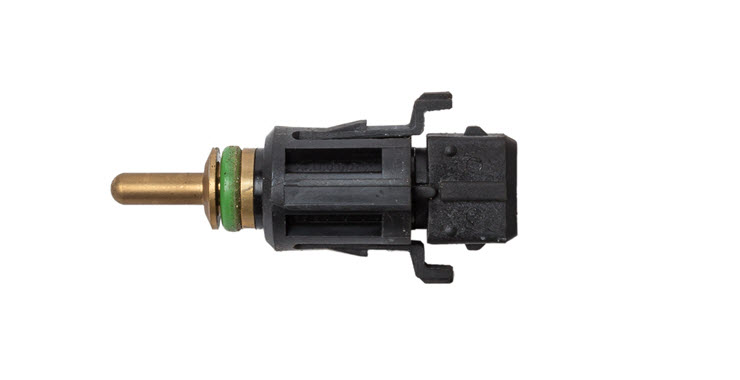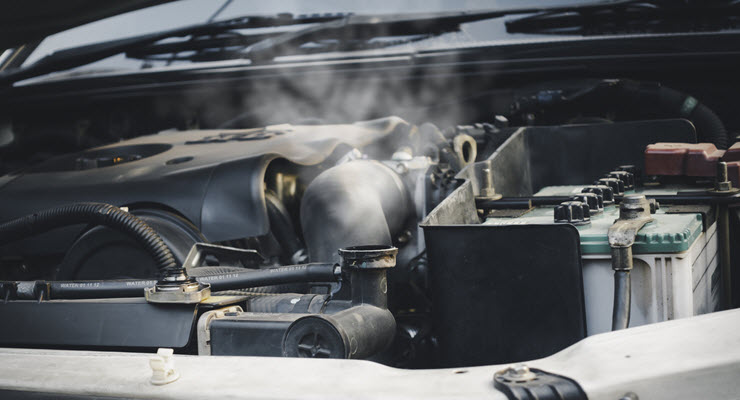A Coolant Temperature Sensor (CTS) is a type of sensor that is used to measure the temperature of a vehicle’s coolant. The coolant is a substance that is used to cool the engine, and the CTS helps to ensure that the coolant remains at a consistent temperature. If the coolant becomes too hot, it can cause the engine to overheat and fail.
When an engine overheats it causes the engine to seize. The engine will then need to be replaced, which can be incredibly expensive. What’s worse is that it is almost always preventable! If your engine overheats, shut it off and call for a tow. It is important to have it serviced by our qualified mechanic as soon as possible to avoid further damage to the engine. We will inspect your engine cooling system, including the coolant temperature sensor, to make sure broken parts are replaced and working properly.
Where is the Temperature Sensor?
The CTS is typically located near the thermostat, and it consists of a metal probe that is inserted into the coolant. The CTS is connected to an electrical circuit, and as the coolant temperature changes, so does the resistance of the sensor.
This change in resistance is used to calculate the coolant temperature, which is then displayed on a gauge or warning light. If the coolant temperature rises too high, the CTS will send a signal to the engine control unit (ECU), which will activate the cooling fan and/or open the radiator vents.
Signs of Coolant Temperature Sensor Failure
- Illuminated check engine light
- Engine misfires
- Poor fuel economy
- Engine overheating
- Reduced engine power and performance
If you notice any of these signs, it’s important to have your vehicle checked by our qualified mechanics as soon as possible. Ignoring coolant temperature sensor failure can lead to serious engine damage, so it’s best to nip any potential problems in the bud.
Causes of Coolant Temperature Sensor Problems
There are several potential causes of coolant temperature sensor failure. The most common cause is a build-up of deposits on the sensor, which can interfere with its ability to accurately measure the coolant temperature.
Another possibility is that the coolant level is too low, which can cause the sensor to overheat and fail. Another common cause is coolant leaking into the electrical connector, which can damage the sensor or its wiring.
In some cases, coolant temperature sensor failure may also be caused by a problem with the engine’s cooling system, such as a leak in the radiator or a clogged coolant hose.
Lastly, coolant temperature sensor failure can also be caused by a faulty coolant temperature gauge. If the gauge is not reading the correct coolant temperature, it can cause the sensor to fail.
Preventing Problems in the Future
Proper car maintenance is essential for keeping your vehicle in good condition and ensuring that it runs safely and efficiently. By regularly checking and servicing your car, you can catch any potential problems early and prevent them from becoming more serious (and expensive) down the line.
Additionally, maintaining your car can help to extend its life and improve its resale value. Even something as simple as regularly washing and waxing your car can make a big difference. So if you want to keep your car running smoothly for years to come, be sure to give it the care it deserves and keep the engine at its proper functioning temperature at all times.

Escondido German Auto Shop: Your Volkswagen Specialists
We are conveniently located for clients in Escondido, Rancho Bernardo, and Valley Center, California and have the tools necessary to get your Volkswagen back to top condition with low stress and affordable repairs. We provide service and maintenance to Volkswagen owners and also service other popular brands in the area, such as Audi, BMW, MINI, Porsche, and Sprinter.
If you would like to learn more about what we can do to repair your coolant temperature sensor or any other car-related issue, feel free to call us to learn more or stop by our shop to talk with our friendly technicians in person! We are happy to listen to your questions and provide expert answers with solutions for your car care needs.

